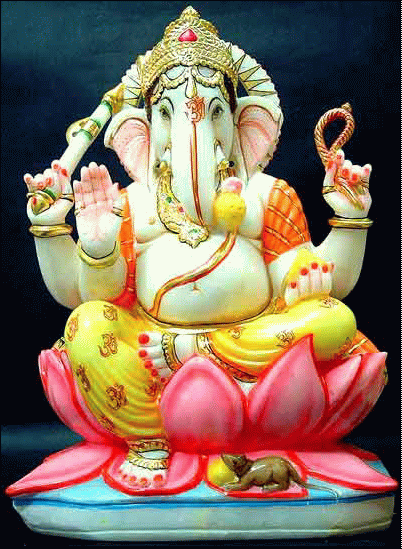CSC 400 Graduate Problem Seminar

Ganesh:
A deity for researchers.
Information
Course: CSC 400 Graduate Problem Seminar
Instructor: Randal C. Nelson
Time: WF 11:00 - 12:15
Room: CSB 632
Summary
This course is intended to provide first year graduate students
with an introduction to the faculty and research programs in the department,
and supply a hands-on introduction to various issues that arise in
computer science research.
A significant component of the course will revolve around various projects
that may be "impossible", in the sense that good solutions are not known
There will be a set of team system building efforts.
These will be described more full later, but will consisting
of the following goals:
- 1. Researching, understanding, and presenting the state of the art in
a specified semi-open problem,
- 2. grounding and solidifing this understanding by
implementing a solution that approaches the state of the art, and
- 3. attempting to identify areas where the state of the art
might be pushed and pushing on it.
Team members will regularly present project progress the the rest of the
class during semi-formal discussion sessions, where team understanding,
approaches and progress, will be critiqued, and potentially modified.
Teams will also prepare weekly written reports
There will also be individual final projects drawn from problems proposed
by the faculty (or possibly senior graduate students) that provide
the opportunity to get involved in ongoing research in the department,
and try out potential research relationships with faculty.
A second component of the course consists of guest lectures by
researchers in the computer science department.
The course may also address issues in proposal writing and evaluation.
Attendance is mandatory. Participation in critique sessions is an
essential part of the experience, as is attendance at guest lectures.
There may be 5-minute "easy" quizzes on material occuring in the previous
class as a means of documenting attendance and attention.
This could include the content of unscripted discussions.
This course is sometime refered to as "graduate boot camp".
It should not be undertaken lightly.
It is expected to be a significant amount of work. Research is that way.
It is also likely to be the first course where the professor is not
providing material and answers, or detailed instructions.
That is also how research is.
If it's your bag however, it could be a bit of fun in addition to a lot of
work, and you will learn a lot (not all of it technical knowledge).
Prerequisites/Requirements
-
Ability to program well, and as part of a group.
The projects will require the use of multiple source files and
libraries, so experience with programming utilities such as make, or
more sophisticated systems is desireable.
Efficiency is an issue in the projects, so ability to program in
a relatively efficient language such as C or C++ (though not assembly)
is required. Java may not cut it.
-
Knowledge of everything in the world or the ability to acquire it quickly.
Course Text Books
There are no required texts. However, the following are interesting and
relevant reading, in whole or in part.
- "Out of Their Minds: The Lives and Discoveries of 15 Great Computer
Scientists" by Dennis Shasha and Cathy Lazere,
(Copernicus, an imprint of Springer-Verlag, 1995).
The title says it all.
- "ACM Turing Award Lectures: The First Twenty Years, 1966-1985"
(ACM Press, 1987). The best and the brightest in CS,
in their own words!!!
- "The Double Helix: A Personal Account of the Discovery of the
Structure of DNA" by James D. Watson, W. W Norton & Co., 1981;
Also in print from Touchstone Books, 2001.
A real classic.
- "Who Got Einstein's Office?" by Edward Regis, Perseus Publishing, 1988.
A history of the Institute for Advanced Study,
which was home to fourteen Nobel laureates and most of the century's
greatest mathematicians and physicists, including Einstein,
Kurt Godel, and J. Robert Oppenheimer.
- "A Gift of Fire" by Sara Baase (Prentice-Hall 1997).
Very readable inquiry into some of the ethical societal issues
arising from mastery of information technology.
- "Computerization and Controversy: Value Conflicts and Social Choices",
edited by Charles Dunlop and Rob Kling, (Academic Press, 1991).
Older, but still largely relevant set of essays.
- "Tomorrow's Professor: Preparing for Academic Carers in Science and
Engineering" by Richard M. Reis (IEEE Press 1997).
For anyone contemplating a career in academics.
Grading
Some combination of:
Attendance/quizzes, class participation, presentations, project reports,
project accomplishments.
As a first approximation, 20% each.

